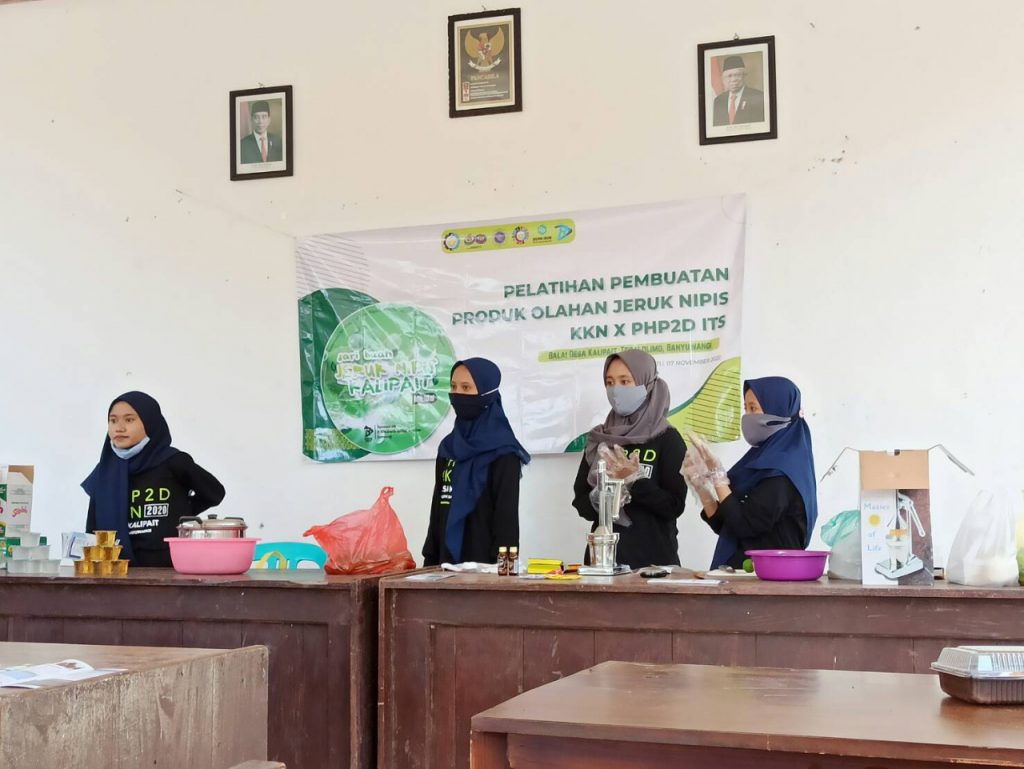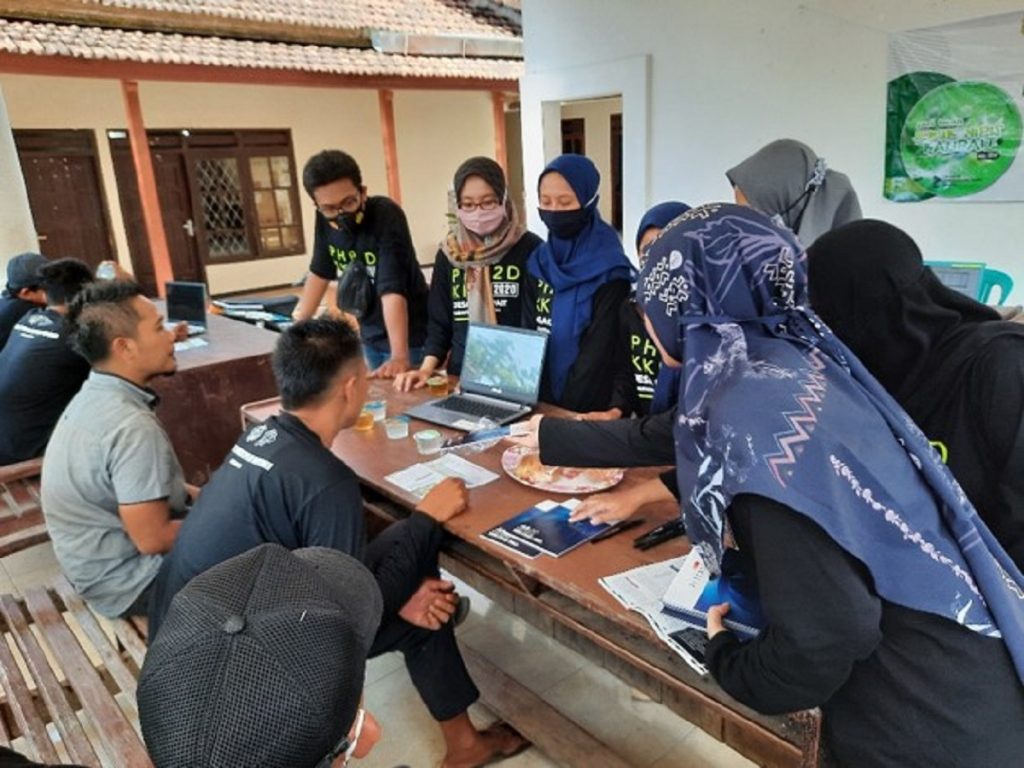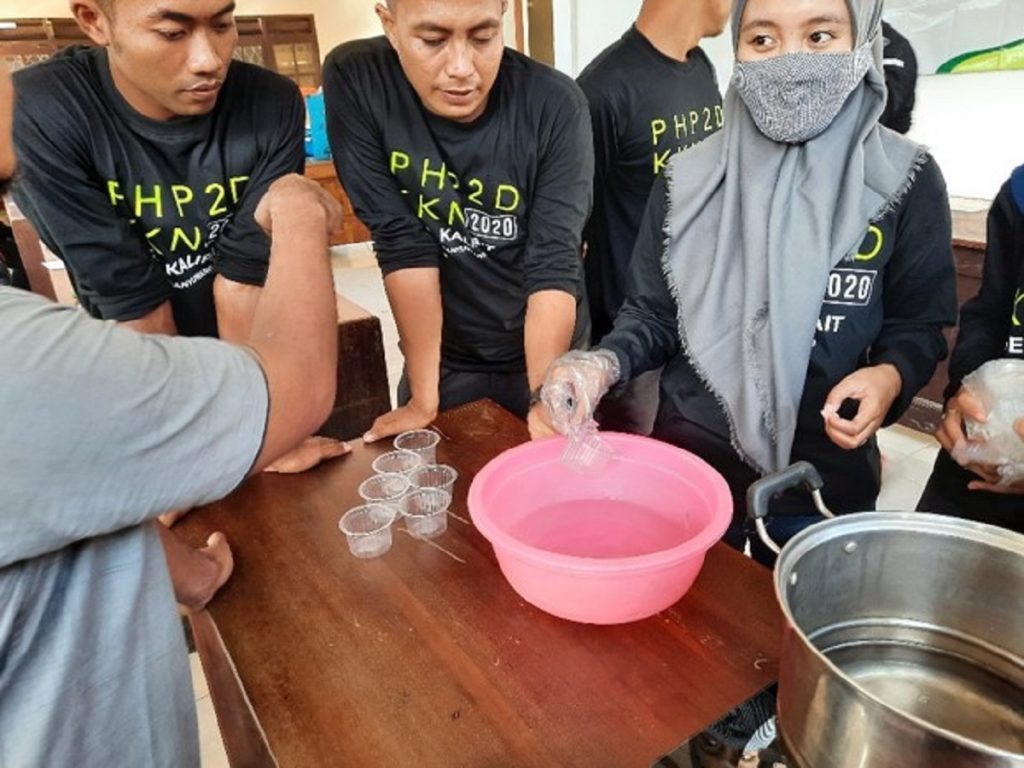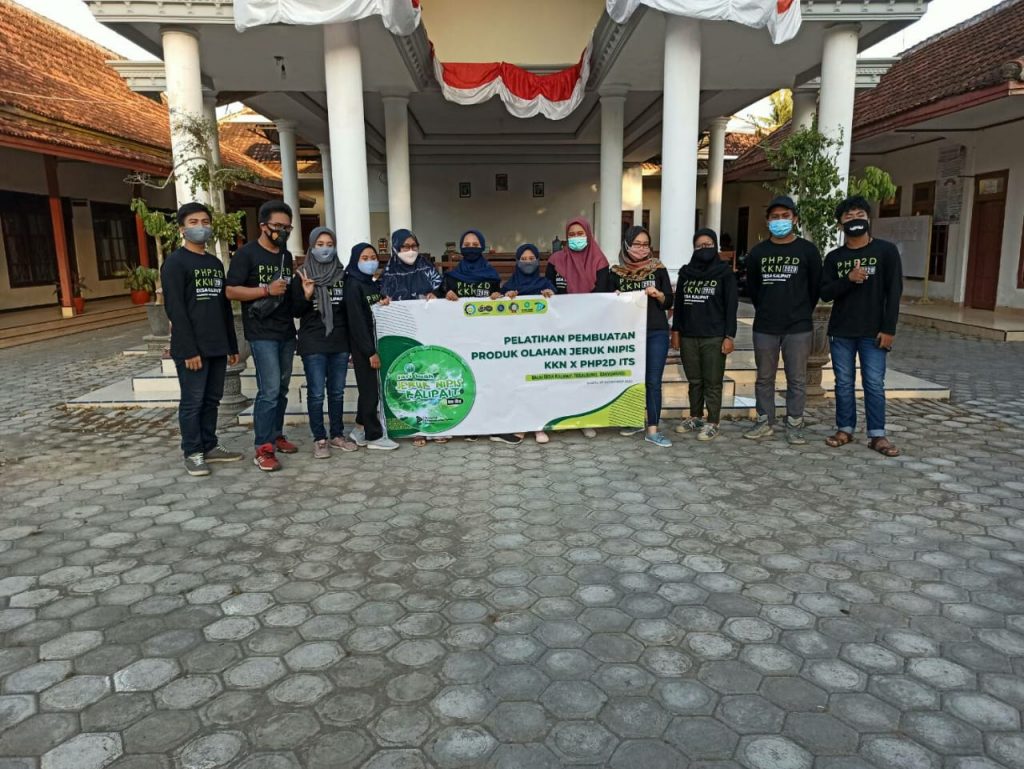ITS Response to Village Potential Management through BUMI IBOE

Training on making processed lime by the BUMI IBOE ITS Team at BUMDes Renville, Kalipait Village
Kampus ITS, ITS News –Responsive to problems in the community, Institut Teknologi Sepuluh Nopember (ITS) students often solve them with adaptive solutions. One of them is the BUMI IBOE Team, which actively manages Village-Owned Enterprises (BUMDes).
Coming with the latest ideas, the BUMI IBOE Team provided innovative ideas in processing lime products in Kalipait Village, Banyuwangi City, East Java. BUMDes Impian IBOE (BUMI IBOE) is a team that has the vision to improve BUMDes throughout Indonesia.
Improving the BUMDes throughout Indonesia can be done by synergizing all the existing elements, be it society, students, or higher education institutions based on their Tri Dharma. The word Iboe itself comes from the Dutch language, Inheems Bedwelmend Omhoog Euwig, which means people who want to move forward and are determined.
Adhimas Nurul Mustofa, Chairman of the BUMI IBOE Team, said that his team was formed during the ITS Young Technopreneur (IYT) competition, and his proposal was successfully funded. In their business design proposal, they plan to develop Kalipait Village, a village that is the holder of Alas Purwo National Park, Banyuwangi. Thus, it makes the town have extensive agricultural land, with primary commodities in dragon fruit, siam lime, and lime.

ITS IBOE BUMI Team which is conducting counseling to the management of BUMDes Renville, Kalipait Village, Banyuwangi
At the initial idea of Adhimas and the team, Kalipait Village was designed as an agricultural coordinator. In this design, agricultural products from the village will be sold to BUMDes and then marketed outside. However, the town only approved the lime farming system because the commodity was often wasted. “We adjusted this potential so that the village approved the idea of making a product design for processed lime,” said the ITS Chemistry Department student.
From this idea, the team currently founded on July 5, 2020, has produced processed recipes and finished products. The BUMI IBOE Team designed the product design by researching beverage manufacturing recommendations published by the Food and Drug Supervisory Agency (BPOM) and the Food and Drug Research and Research Center (PRKOM). “We also conducted a study by visiting units that produce processed lime and other fruit juices as a place to discuss product manufacturing,” explained Adhimas.
Adhimas said that the processed lime product still needs to be readjusted to be sold to the general public. Reflecting on the research process experience, the BUMI IBOE Team always finds differences in taste between one processed product and another. “Therefore, we are continuing to carry out quality control,” he admitted.
Apart from being funded in the IYT competition, the idea for the BUMI IBOE Team also received funding from several other competitions. Like the Holistic Village Development and Empowerment Program (PHP2D), a sociopreneur program under the Ministry of Education and Culture (Kemdikbud) focuses on the social field of society for student organizations. “For that, when joining this program, BUMI IBOE was under the name of the ITS Institute for Talent for Talent (LMB),” said Adhimas.

The BUMI IBOE ITS team who is providing training in making processed lime juice products
To implement the PHP2D program, the BUMI IBOE Team, together with several other ITS students, held training on making processed lime products early last November. This training was attended by the management of BUMDes Renville, Kalipait Village. On this occasion, students taught how to make processed lime juice products, calculating selling prices, optimizing production, packaging, and determining the target market.
In the future, Adhimas hopes that he and the team can maintain this program’s sustainability and continue to improve the welfare of the community. This has been done by increasing pandemic conditions which have decreased people’s income. “Not only that, we also hope that the research that has been done a lot in the campus world does not end in journal publications or is silent in the library,” he explained.
For example, he gave an example in seeing lime, which has the potential to be exported to Pakistan. However, local products are inferior to Thai products that do not have seeds and contain lots of water. Adhimas argues that Indonesia can overcome this with agricultural engineering technology that may already have ITS research on it, but it has not been implemented. “So that in the future, more applications of appropriate technology are needed to be applied to society,” he concluded. (tri/ory/ITS Public Relations)

The BUMI IBOE team and several other ITS students provide training in Kalipait Village, Banyuwangi.
Related News
-
ITS Lecturer Introduces Madurese Culture to the International Stage
ITS Campus, ITS News — Continuing to show local wisdom to the world community, this time a lecturer from the Department
November 27, 2020 23:11 -
ITS Researchers Remind TKDN is Crucial for Economic Independence
ITS Campus, ITS News — The Domestic Component Level (TKDN) is the key to restoring the glory of the Indonesian
November 27, 2020 23:11 -
Strengthening Quality Education, ITS Professor Develops Adaptive Technology for Students
ITS Campus, ITS News — Differences in students’ abilities in understanding lessons are often a challenge for teachers in the classroom.
November 27, 2020 23:11 -
ITS Graduates Create Reverse Logistics Model for PET Plastic Waste Recycling
ITS Campus, ITS News — Doctoral graduate from the Department of Industrial and Systems Engineering, Sepuluh Nopember Institute of Technology (ITS) Dr. Yuniar
November 27, 2020 23:11
